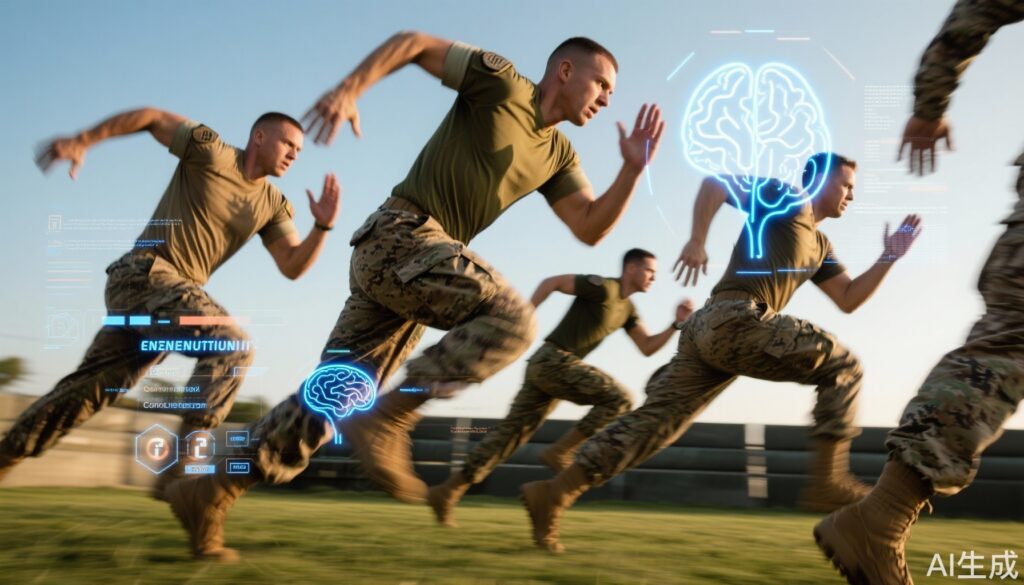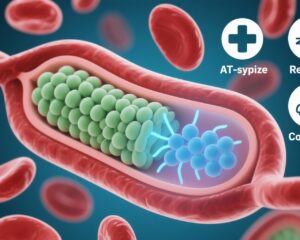Introduction
Optimizing human performance during stressful physical and cognitive conditions remains critical for high-stakes military operations. Tactical personnel often face intense environments that can induce cognitive fatigue, compromising decision-making and operational effectiveness. While caffeine is globally recognized as the most widely consumed psychoactive substance used to enhance alertness and cognitive function, its common side effects—such as anxiousness, micro-saccades (small, involuntary eye movements), and irritability—may negatively impact performance in tactical settings. Therefore, alternative or adjunctive interventions are necessary to mitigate these drawbacks while enhancing cognitive resilience.
Theacrine, a purine alkaloid structurally related to caffeine but with a notably longer half-life and lower potential for habituation and side effects, is proposed as a promising caffeine alternative or complement. This alkaloid potentially offers sustained cognitive benefits with fewer adverse effects, making it attractive for enhancing cognitive-behavioral performance under fatigue.
Methods
A study was conducted involving 20 tactically trained participants (5 females, 16 males; average age 21.5 ± 3.8 years). Participants completed one baseline and three subsequent experimental visits. The baseline session included familiarization with a series of cognitive tasks and a graded exercise test to determine individual maximal oxygen uptake (VO2max), establishing personalized exercise intensity benchmarks.
During the double-blind, placebo-controlled, randomized experimental sessions—each separated by at least 96 hours—participants underwent cognitive testing before and after ingestion of one of three interventions: 300 mg caffeine (CAF), 150 mg caffeine combined with 150 mg theacrine (CTC), or a placebo (PLA). The cognitive tests applied included:
– Dynavision (measuring visuomotor response and attention)
– Trazer (a virtual reality-based cognitive-motor task)
– Object Hit and Avoid (evaluating selective attention and motor response)
– Anti-Saccade (testing inhibitory control over automatic eye movements)
– Two-Back (assessing working memory and cognitive flexibility)
Participants completed cognitive assessments 60 minutes post-supplementation to align with peak pharmacological effects. Following cognitive tests, participants performed a high-intensity interval training (HIIT) session consisting of 10 intervals at greater than 90% VO2max, with active recovery between intervals.
Reaction time (RT) evaluations were administered repeatedly after the 4th and 8th intervals, as well as immediately and 30 minutes after exercise, while heart rate and heart rate variability (HRV) were continuously monitored to evaluate autonomic nervous system activity under stress.
Changes in cognitive and physiological measures were calculated relative to baseline values. Data were analyzed using repeated measures ANOVA with Bonferroni correction to control for multiple comparisons, establishing significance at an alpha level of 0.05.
Results
Both CAF and the combined CTC interventions consistently enhanced cognitive and physical performance compared to placebo.
In the Two-Back working memory task, participants receiving CTC achieved significantly higher total accuracy (p < 0.01) compared to placebo. Both CAF and CTC groups made fewer target errors (p < 0.01) and non-target errors (CAF: p = 0.03; CTC: p < 0.01) than placebo, indicating improved attentional control and memory precision. Notably, CTC participants demonstrated faster reaction times (p = 0.03) and lower variability in reaction times for non-target trials versus both placebo and caffeine alone (p < 0.01), suggesting more consistent cognitive processing.
In the Dynavision Go/NoGo task, which tests response inhibition and processing speed, both CTC (p = 0.01) and CAF (p = 0.03) exhibited significantly faster reaction times than placebo across all time points measured.
After the exhaustive exercise session, cognitive performance improved relative to post-supplementation measurements alone—with accuracy (p = 0.01) and reaction times (p < 0.01) showing marked enhancement—indicating a potential interaction between supplementation and exercise-induced arousal.
In the Object Hit & Avoid task, both caffeine-containing interventions significantly improved task accuracy (p < 0.01) while reducing omission errors (failure to respond, p < 0.01) and commission errors (responding incorrectly, p < 0.01) compared to placebo.
Physiologically, measures of heart rate variability (including RMSSD, NN intervals, and SDNN) rose significantly following supplementation (p < 0.01), reflecting increased autonomic adaptability, but declined immediately (p < 0.01) and 30 minutes post-exercise (p < 0.01) consistent with physical fatigue effects. Blood lactate levels decreased significantly at 5 and 10 minutes post-exercise (p < 0.01 compared to immediately post-exercise), indicating effective metabolic recovery.
Discussion
This study demonstrates that ingestion of both caffeine alone and a caffeine-theacrine combination significantly enhances various aspects of cognitive performance before and after fatiguing exercise. Importantly, the combination (CTC) provided cognitive benefits beyond those achieved by caffeine alone, such as higher memory accuracy and more stable reaction times. These findings support the hypothesis that theacrine, when used alongside caffeine, can improve cognitive resilience under physical stress while potentially mitigating some common caffeine side effects through lower caffeine dosing.
Given the high cognitive demands and physical stress inherent in tactical military operations, the ability to maintain and even improve cognitive function during and following intense physical exertion is invaluable. While caffeine remains a valuable ergogenic aid, its side effects can limit effectiveness for some individuals. The caffeine-theacrine combination offers a promising non-pharmacological alternative or adjunct by extending cognitive benefits and reducing habituation risks.
Conclusion and Future Directions
Combining lower doses of caffeine with theacrine effectively improves cognitive and behavioral performance before and after physically fatiguing exercise, equaling or surpassing the effects of higher-dose caffeine alone. This strategy may benefit tactical personnel and others exposed to physically and cognitively stressful environments by providing sustained cognitive enhancement with fewer adverse side effects.
Future research should explore:
– Higher doses of theacrine alone or combined with caffeine
– Long-term chronic supplementation effects
– Cognitive and physical responses to extended-duration exercise
– Efficacy across diverse cognitive domains in various stress and environmental conditions
These investigations will determine optimal dosing strategies and applications of the caffeine-theacrine combination to support cognitive resilience in demanding operational contexts.
References
Lints BS, Harrison AT, Stray-Gundersen SO, Mastrofini GF, Romersi RF, Nakagawa NK, Yoder MB, Martin-Diala CE, Chandler AJ, Moore RD, Arent SM. A caffeine and theacrine combination improves cognitive performance in tactical personnel under physically fatiguing conditions. Journal of the International Society of Sports Nutrition. 2025 Dec;22(1):2536146. doi: 10.1080/15502783.2025.2536146. Epub 2025 Jul 22. PMID: 40693646; PMCID: PMC12284986.



